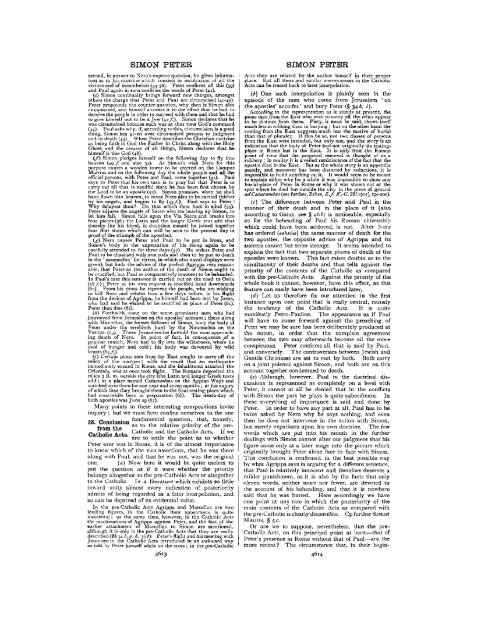cheenc03a.pdf
cheenc03a.pdf
cheenc03a.pdf
Create successful ePaper yourself
Turn your PDF publications into a flip-book with our unique Google optimized e-Paper software.
SIMON PETER<br />
SIMON PETER<br />
Acts they ire related by the author lhimrelf in their proptr<br />
place. But all rhesc and similar n~~euen~icrrer in the Cathohc<br />
Acts sm be traced back to later interpolation.<br />
(6) One such interpolation is plainly seen in the<br />
e~aode of the men who come from Jerusalem 'on<br />
Peter then dies 162)<br />
(i) Ccrtain pious men from the East rou~hto c;lm,.off the<br />
relics of the mrrryn: with the rcmlt that an carthq1,ake<br />
immediately enrucd in Rome. and ihe inhahiranti nrlacked ihc<br />
Orirntrlr, who at once took nighr. The Ro-nr de sited the<br />
rciics 3 R. m. ourride the city (the Latin and long~r I%ektertr<br />
add: at n place named Crtacumbar on the Appian Way) -d<br />
watched overthcmfor one yearandseven months; at the ex iry<br />
ofwhich time they brought ihrm torhe finalrerting-piace diCh<br />
had meanwhile bean iu preparation (66). The deathday of<br />
borh s~porllei war June 29 (67).<br />
Many point5 in there interesting con,positionr invite<br />
inquily : but we muit here confine ourseiver to the one<br />
36, fundamental question, that, namely,<br />
as to the relative priority of the prethe<br />
Acts, Catholic and the Catholic Acts. If we<br />
CaWIOlic<br />
are to settle the point as to whether<br />
Peter ever war in Rome, it is of the utmost impoitance<br />
to know ahich of the two assertions, that he was there<br />
along with Pnul, and that he was not, was the original<br />
one. (a) Now here it would be quite useless to<br />
put the question as if it were whether the priority<br />
belongs altogether to the pre-Cntholic Actnor altogether<br />
to the Catholic. In a literature which exhibits so little<br />
innard unity almost every indication of posteriority<br />
admits of being regarded as a Inter interpol'ztion, and<br />
so can be deprived of its evidential value.<br />
two apostles: the opposite advice of Agrippa and its<br />
success cmnot but seem strange. It seems intended to<br />
explain the fact that two separate places of death of the<br />
apostles were known. This fact raises doubts as to the<br />
simultaneity of their drathr and thus tellr against the<br />
priority of the contents of the Catholic as compared<br />
with the pre-Catholic Acts. Against the priority of the<br />
whole book it cumlot, however, have this effect, as this<br />
feature can easily have been introduced Later.<br />
(d) Let us therefore fix our attention in the first<br />
instance npon one point that is really central, namely<br />
the tendency of the Catholic Acts. It ir quire<br />
manifestly Petio-Pauline. The appearance ar if Paul<br />
will have to come forward against the preaching of<br />
Peter we may be sure has been deliberately produced at<br />
the outset, in order that the complete agreement<br />
between the two may afterwards become ail the more<br />
CO~SP~CUOUS. Peter confirms all that is raid by Paul.<br />
and converrel,.. The controverries between Tewish and<br />
"<br />
(c) Although, however, Paul in the doctrinal discussions<br />
is represented as completely on a level with<br />
Peter. it cnnnot at all be denied that in the conflict.<br />
with Simon the part he plays is quite subordinate, 1.<br />
these everything of importance is said and done by<br />
Peter. In order to hue an" , oat . at all. Paul has to be<br />
lwice asked by Nero why he says nothing, and even<br />
then he does not intervene in the action with Simon.<br />
D U merely ~ expatiates upon his oxvn doctrine. The few<br />
words which are put info his mouth in the further<br />
leulings with Simon cannot alter our judgment that his<br />
figure came only at a later stage into the picture which<br />
,riginally brought Peter alone face to face with Simon.<br />
This conclusion is confirmed in the best possible way<br />
3y what Agrippasays in arguing for a different sentence.<br />
!hat Paul is relatively innocent and therefore deserves a<br />
milder punishment, as it is also by the facts that only<br />
:leven words, neither more nor fewer, are devoted to<br />
:i~e account of his beheading, and that it is nowhere<br />
;aid that he was buried. Here accordingly we have<br />
3°C poinf at any rate in which the posteriority of the<br />
mein contents of the Catholic Acts as compared with<br />
:he pre-Cuthollc ir clearly dircernible. Cpfurther SIMON<br />
>1acur, 9 gr.<br />
Or are we to suppose. neuerthelers, that the pre-<br />
Zutholic Acts, on this piincipal point at least-that of<br />
Peter's presence in Rome without that of Paul-are the<br />
more recent? The circumrtance that, in their begin-<br />
4614
















